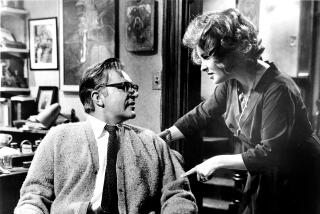Review: ‘Professor Marston and the Wonder Women’ is a disarming exploration of a superhero’s kinky roots
For a movie with no shortage of ropes, whips and naughty-nurse role play, the actual moment of consummation in “Professor Marston and the Wonder Women” is remarkably tame.
Audiences will recognize the visual cues of the upmarket Hollywood drama, the traditional panicky “sex scene! sex scene!” signifiers. The camera, previously content to regard the characters from a considered distance, leans in for a few lurching handheld close-ups. Nina Simone’s “Feeling Good” floods the soundtrack as half-clad bodies and the occasional tastefully bared nipple fill the screen.
The most notable thing about it is that there are three intertwined figures rather than two, which the writer-director Angela Robinson trusts will be radical enough. She turns out to be right. One of the aims of this movie, a refreshingly different kind of superhero origin story, is to present a tale of bohemian free love and ménage à trois role play in a way that feels entirely natural, even rational. You may long for a more disreputable, less buttoned-up telling, but there is something about this one’s sleek, streamlined conventionality that feels both appropriate and pleasing.
The first of the title’s three principals is William Moulton Marston (Luke Evans), the Harvard professor and psychologist who, under the pseudonym of Charles Moulton, created the beloved character of Wonder Woman, a.k.a. Diana of Themyscira, most recently immortalized in a major summer blockbuster.
As this very different movie unpacks, Diana was also conceived as a poster girl for the idea of bondage as feminist liberation, and a shrewd amalgam of the two most important women in his life: his wife, Elizabeth Holloway Marston (Rebecca Hall), herself a brilliant psychologist who made significant contributions to her husband’s work, and his research assistant, Olive Byrne (Bella Heathcote), who eventually became the Marstons’ lover and domestic partner.
We watch this unusual state of affairs take shape starting in 1928 at Harvard, where William teaches his theories of human behavior, focusing on the natural interplay of dominance and submission in male-female relationships. Fittingly enough, he can always count on Elizabeth to push back against and sharpen his ideas, often while swilling liquor from their secret stash. (Prohibition is in full effect.)
Into their office steps Olive, William’s shy new assistant, who is taken aback when Elizabeth orders her not to sleep with her husband in blunter terms than I can repeat here. Olive is sufficiently young and beautiful that you can understand Elizabeth’s concern. (“I don’t experience sexual jealousy,” she insists to William, later adding, “I do have professional jealousy.”) But as Olive and the Marstons put their initial awkwardness aside and get to know each other, it soon becomes clear that attraction is very much a three-way street.
What gives this romantic and psychological triangle a frisson of pleasure is the way all three characters approach it as a kind of experiment. Robinson skillfully captures the sharp words and unspeakable passions ricocheting among her three leads, the steady escalation of desire on all sides. The emotional reality of the situation becomes impossible to deny once they submit to an early version of a lie-detector test (one of the Marstons’ more significant inventions, which Wonder Woman fans will quickly recognize as the inspiration for the Lasso of Truth). The erotic tension is literally off the charts.
So, too, is the on-screen chemistry. In the end, “Professor Marston and the Wonder Women” gets away with its cheekiest conceits for the simplest and most intuitive of reasons, which is that the actors commit themselves entirely. Evans may be dreamier than the real William Moulton Marston, but he sells you on everything about the man, from his passionate belief in the superiority of women to his simultaneous insatiable lust for them; he shows you the sincerity beneath the nonstop hustling.
Heathcote is quietly breathtaking as the most recessive, compliant and desired member of the triangle, though she makes it clear, in line with William’s ideas, that Olive’s willingness to be seduced doesn’t make her a fool. Byrne was, among other things, the niece of the pioneering feminist Margaret Sanger, whose ideas informed the Marstons’ work and who gets a few shout-outs here.
As for Hall, who can convey intellectual vigor like few other actors, she’s in a class by herself: a ferocious wit one minute, a seething ball of resentment the next. The arc of the movie is hers, as Elizabeth moves from furious self-possession toward a humble assertion of a need she didn’t know existed.
The picture loses some steam in its more ungainly second half, in which William, Elizabeth and Olive move to the New York suburbs and raise four kids (two from each mother), a design for living that inevitably scandalizes the neighbors. How their visit to a forbidden house of BDSM pleasures begets the first “Wonder Woman” comic book in 1940 is laid out with more expedience than grace. A framing device in which William is mercilessly grilled by Josette Frank (Connie Britton), the director of the Child Study Assn. of America, is as clunky and expository as it sounds.
You could, in short, criticize Robinson’s movie for sticking too closely to formula — or, to borrow the metaphor of the moment, for never breaking free of its narrative chains. But this is one instance, at least, in which I share Marston’s view that submission has its uses.
The spirited, populist appeal of Wonder Woman is partly what allowed her to remain such a playful paradox: a pinup and a pioneer, an object of desire and an avatar of empowerment wrapped up (so to speak) in one. In similar fashion, “Professor Marston and the Wonder Women” embraces its own contradictions. It pays engaging, accessible homage to three gifted minds who found liberation in bondage to one another, and in the process turned their home into their greatest adventure.
------------
‘Professor Marston and the Wonder Women’
Rating: R, for strong sexual content including brief graphic images, and language
Running time: 1 hour, 48 minutes
Playing: In general release
Movie Trailers
More to Read
Only good movies
Get the Indie Focus newsletter, Mark Olsen's weekly guide to the world of cinema.
You may occasionally receive promotional content from the Los Angeles Times.











